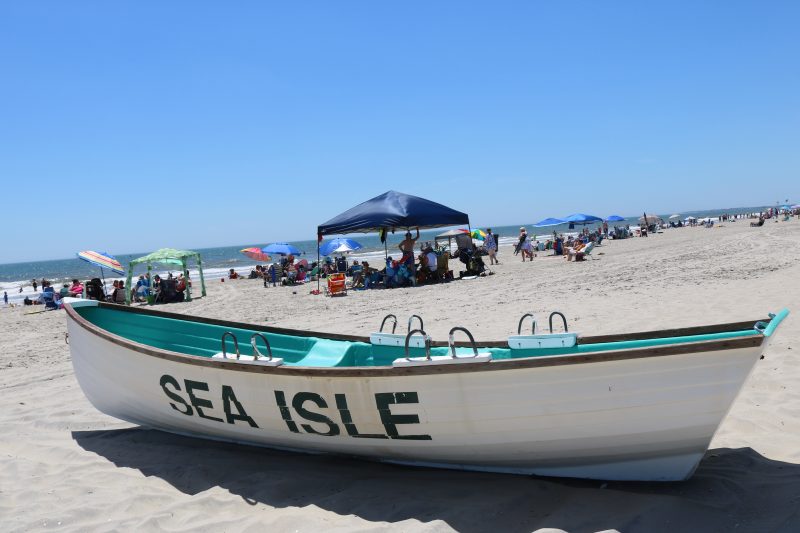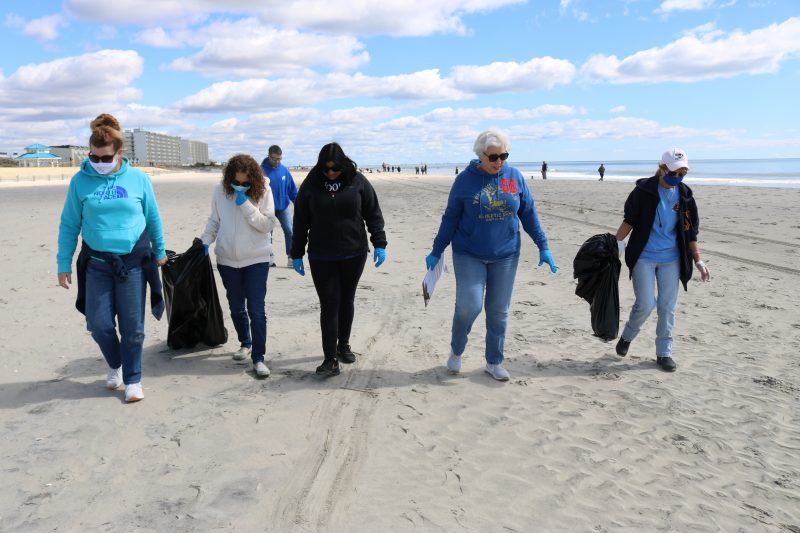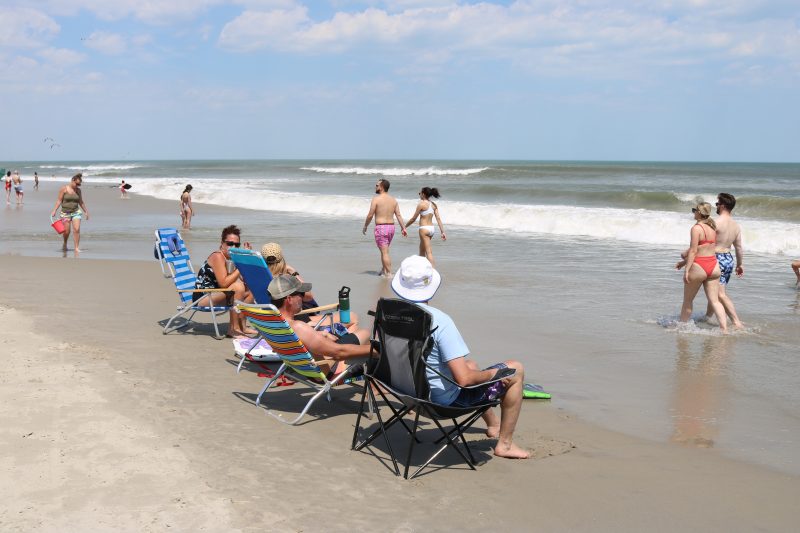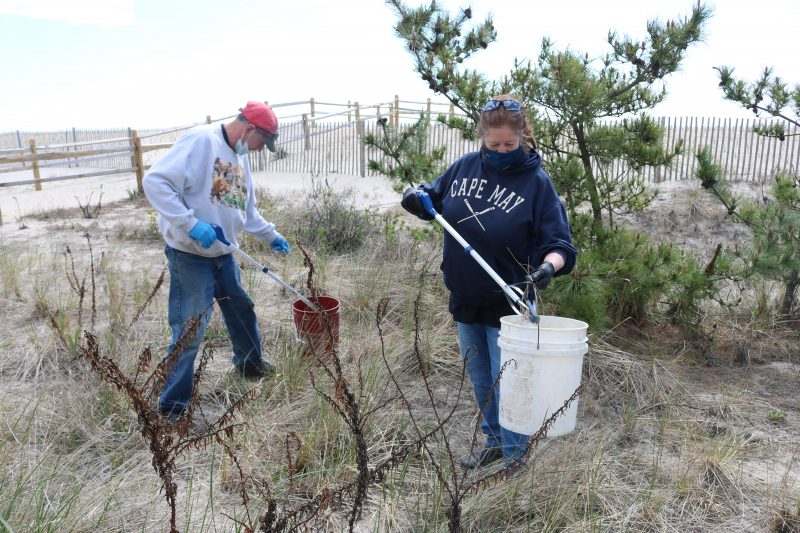Sea Isle's beach patrol may increase its pay in 2022 to help recruit more lifeguards.
 By DONALD WITTKOWSKI
By DONALD WITTKOWSKI
Fewer smokers seem to be using Sea Isle City’s beaches as their personal ashtray.
A smaller number of discarded cigarette butts were found during the city’s annual spring community beach cleanup on April 17 than in previous years in what is seen as an encouraging trend, according to a newly released report.
The reason appears to be a smoking ban that began on Sea Isle’s beaches in 2019, the report by the city’s Environmental Commission concluded.
“It must have something to do with it because you no longer see people smoking on the beach. There has to be some correlation,” city spokeswoman Katherine Custer said Friday of the smoking ban and the smaller number of cigarette butts found on the beach.
A statewide smoking ban at New Jersey’s beaches and public parks took effect Jan. 1, 2019. The state gave shore communities the discretion to either ban smoking altogether or designate small areas where beachgoers could still light up. Sea Isle imposed a complete smoking ban on its beaches.
The beach cleanup report suggests that the smoking ban is helping to keep Sea Isle’s shoreline cleaner, although cigarette butts are still being found by the hundreds.
Altogether, 716 discarded cigarette butts were removed from the beaches during the April cleanup. In the spring beach cleanup in 2018, there were 1,240 cigarette butts and in 2019 there were 1,026, the report said. The cleanup was canceled in 2020 due to the pandemic.
Despite the downward trend overall, cigarette butts still remain the single most common source of litter discovered on Sea Isle’s beaches, according to the report.
“Data collection from the April 17, 2021, beach clean-up event shows a decrease on the number of collected cigarette filters compared to previous years beach cleanups. However, cigarette filters or butts are the most common form of litter found in our Sea Isle beaches,” the report states.

Employees from the 1st Bank of Sea Isle City walk along the beach looking for litter during the spring cleanup.
The report also notes that cigarette butts are a type of non-biodegradable plastic containing heavy metals, such as arsenic, and toxic organic compounds, such as nicotine and hydrocarbons.
“This smoking ban should facilitate a decrease in the number of cigarette filters littered on the beach, dunes and their proximity and it should also provide a decrease in the toxic effects triggered by cigarette butts. Sea Isle City Environmental Commission has been evaluating the effectiveness of this ban by comparing the number of plastic cigarette filters collected from previous beach clean-up events that took place before the smoking ban went into effect to data collected after the smoking ban was imposed,” according to the report.
Altogether, 4,826 pieces of trash, litter and other debris were removed from the beaches and dunes by more than 150 community volunteers who participated in the spring cleanup.
Consistent with previous cleanups, discarded plastic items were by far the most common type of junk found on the beaches – 3,347 pieces in all, or 69 percent of the entire load of trash that was picked up, the report says.
The report also includes comments from some of the volunteers who participated in the cleanup. Some of the comments varied significantly about the number of cigarette butts found on the beaches.
“Only one cigarette! Thank you smoking ban!” one volunteer wrote of the number of cigarette butts he or she picked up.
However, another volunteer wrote, “Too many cigarette butts/filters to count.”

The beaches are Sea Isle's main attraction for summer tourists.
Other volunteers commented on the overall appearance of the beaches and dunes – in some cases offering dramatically different views.
“Much less trash, least I’ve seen since 1999!” one volunteer wrote.
“Beach was surprisingly clean,” another said.
“There is a lot of trash on the dunes that is hard to get,” was another comment.
“Lots of plastic bags/wraps from building materials,” another volunteer wrote.
Cigarette filters are considered discarded plastic. Other types of beach trash prominently mentioned in the report were store plastic bags, foam plastics, bottles, food containers, candy wrappers, caps, lids and straws.
“(An) item of concern are plastic store bags, foam and plastic straws that are repeatedly found on our beaches. They pose an environmental damage to the beach and specially to marine life,” the report says.
New Jersey is moving ahead with a statewide ban on plastic grocery store bags, Styrofoam food containers and plastic straws.
At the same time, Sea Isle could consider eco-friendly alternatives to replace the use of plastic store bags, Styrofoam food containers and straws, the report concludes. Currently, some vendors in Sea Isle have already adopted the use of paper straws.
“Some vendors are going a step further by not providing a straw with beverages served unless it is requested by the customer. This is a great initiative as it puts the consumer in the driver seat to make a choice in pursuing a more sustainable option to opt out of the use of a straw,” the report says.

Brother and sister John and Connie Allen, of Quinton Township, N.J., remove litter from Sea Isle's dunes during the spring cleanup.
The author of the report is Environmental Commission member Maria Andrews, who is the associate director of undergraduate programs for the Department of Earth and Environmental Science at the University of Pennsylvania. She was vacationing out of the country and unavailable for comment.
Twice a year, in the fall and spring, Sea Isle holds communitywide beach cleanups in partnership with Clean Ocean Action, a state environmental group. Sea Isle’s cleanup volunteers carefully catalog the types of trash and debris that are found. The information is sent to Clean Ocean Action as part of a statewide database from beach sweeps at shore towns across New Jersey.
Some of the most unusual types of trash or debris found during this year’s spring cleanup in Sea Isle included aluminum siding, smashed dinner plates, vaping devices, a medical marijuana case, a golf club and ball, Barbie doll clothing and a shamrock coin, the report says.
 By DONALD WITTKOWSKI
Fewer smokers seem to be using Sea Isle City’s beaches as their personal ashtray.
A smaller number of discarded cigarette butts were found during the city’s annual spring community beach cleanup on April 17 than in previous years in what is seen as an encouraging trend, according to a newly released report.
The reason appears to be a smoking ban that began on Sea Isle’s beaches in 2019, the report by the city’s Environmental Commission concluded.
“It must have something to do with it because you no longer see people smoking on the beach. There has to be some correlation,” city spokeswoman Katherine Custer said Friday of the smoking ban and the smaller number of cigarette butts found on the beach.
A statewide smoking ban at New Jersey’s beaches and public parks took effect Jan. 1, 2019. The state gave shore communities the discretion to either ban smoking altogether or designate small areas where beachgoers could still light up. Sea Isle imposed a complete smoking ban on its beaches.
The beach cleanup report suggests that the smoking ban is helping to keep Sea Isle’s shoreline cleaner, although cigarette butts are still being found by the hundreds.
Altogether, 716 discarded cigarette butts were removed from the beaches during the April cleanup. In the spring beach cleanup in 2018, there were 1,240 cigarette butts and in 2019 there were 1,026, the report said. The cleanup was canceled in 2020 due to the pandemic.
Despite the downward trend overall, cigarette butts still remain the single most common source of litter discovered on Sea Isle’s beaches, according to the report.
“Data collection from the April 17, 2021, beach clean-up event shows a decrease on the number of collected cigarette filters compared to previous years beach cleanups. However, cigarette filters or butts are the most common form of litter found in our Sea Isle beaches,” the report states.
By DONALD WITTKOWSKI
Fewer smokers seem to be using Sea Isle City’s beaches as their personal ashtray.
A smaller number of discarded cigarette butts were found during the city’s annual spring community beach cleanup on April 17 than in previous years in what is seen as an encouraging trend, according to a newly released report.
The reason appears to be a smoking ban that began on Sea Isle’s beaches in 2019, the report by the city’s Environmental Commission concluded.
“It must have something to do with it because you no longer see people smoking on the beach. There has to be some correlation,” city spokeswoman Katherine Custer said Friday of the smoking ban and the smaller number of cigarette butts found on the beach.
A statewide smoking ban at New Jersey’s beaches and public parks took effect Jan. 1, 2019. The state gave shore communities the discretion to either ban smoking altogether or designate small areas where beachgoers could still light up. Sea Isle imposed a complete smoking ban on its beaches.
The beach cleanup report suggests that the smoking ban is helping to keep Sea Isle’s shoreline cleaner, although cigarette butts are still being found by the hundreds.
Altogether, 716 discarded cigarette butts were removed from the beaches during the April cleanup. In the spring beach cleanup in 2018, there were 1,240 cigarette butts and in 2019 there were 1,026, the report said. The cleanup was canceled in 2020 due to the pandemic.
Despite the downward trend overall, cigarette butts still remain the single most common source of litter discovered on Sea Isle’s beaches, according to the report.
“Data collection from the April 17, 2021, beach clean-up event shows a decrease on the number of collected cigarette filters compared to previous years beach cleanups. However, cigarette filters or butts are the most common form of litter found in our Sea Isle beaches,” the report states.

 The beaches are Sea Isle's main attraction for summer tourists.
Other volunteers commented on the overall appearance of the beaches and dunes – in some cases offering dramatically different views.
“Much less trash, least I’ve seen since 1999!” one volunteer wrote.
“Beach was surprisingly clean,” another said.
“There is a lot of trash on the dunes that is hard to get,” was another comment.
“Lots of plastic bags/wraps from building materials,” another volunteer wrote.
Cigarette filters are considered discarded plastic. Other types of beach trash prominently mentioned in the report were store plastic bags, foam plastics, bottles, food containers, candy wrappers, caps, lids and straws.
“(An) item of concern are plastic store bags, foam and plastic straws that are repeatedly found on our beaches. They pose an environmental damage to the beach and specially to marine life,” the report says.
New Jersey is moving ahead with a statewide ban on plastic grocery store bags, Styrofoam food containers and plastic straws.
At the same time, Sea Isle could consider eco-friendly alternatives to replace the use of plastic store bags, Styrofoam food containers and straws, the report concludes. Currently, some vendors in Sea Isle have already adopted the use of paper straws.
“Some vendors are going a step further by not providing a straw with beverages served unless it is requested by the customer. This is a great initiative as it puts the consumer in the driver seat to make a choice in pursuing a more sustainable option to opt out of the use of a straw,” the report says.
The beaches are Sea Isle's main attraction for summer tourists.
Other volunteers commented on the overall appearance of the beaches and dunes – in some cases offering dramatically different views.
“Much less trash, least I’ve seen since 1999!” one volunteer wrote.
“Beach was surprisingly clean,” another said.
“There is a lot of trash on the dunes that is hard to get,” was another comment.
“Lots of plastic bags/wraps from building materials,” another volunteer wrote.
Cigarette filters are considered discarded plastic. Other types of beach trash prominently mentioned in the report were store plastic bags, foam plastics, bottles, food containers, candy wrappers, caps, lids and straws.
“(An) item of concern are plastic store bags, foam and plastic straws that are repeatedly found on our beaches. They pose an environmental damage to the beach and specially to marine life,” the report says.
New Jersey is moving ahead with a statewide ban on plastic grocery store bags, Styrofoam food containers and plastic straws.
At the same time, Sea Isle could consider eco-friendly alternatives to replace the use of plastic store bags, Styrofoam food containers and straws, the report concludes. Currently, some vendors in Sea Isle have already adopted the use of paper straws.
“Some vendors are going a step further by not providing a straw with beverages served unless it is requested by the customer. This is a great initiative as it puts the consumer in the driver seat to make a choice in pursuing a more sustainable option to opt out of the use of a straw,” the report says.
 Brother and sister John and Connie Allen, of Quinton Township, N.J., remove litter from Sea Isle's dunes during the spring cleanup.
The author of the report is Environmental Commission member Maria Andrews, who is the associate director of undergraduate programs for the Department of Earth and Environmental Science at the University of Pennsylvania. She was vacationing out of the country and unavailable for comment.
Twice a year, in the fall and spring, Sea Isle holds communitywide beach cleanups in partnership with Clean Ocean Action, a state environmental group. Sea Isle’s cleanup volunteers carefully catalog the types of trash and debris that are found. The information is sent to Clean Ocean Action as part of a statewide database from beach sweeps at shore towns across New Jersey.
Some of the most unusual types of trash or debris found during this year’s spring cleanup in Sea Isle included aluminum siding, smashed dinner plates, vaping devices, a medical marijuana case, a golf club and ball, Barbie doll clothing and a shamrock coin, the report says.
Brother and sister John and Connie Allen, of Quinton Township, N.J., remove litter from Sea Isle's dunes during the spring cleanup.
The author of the report is Environmental Commission member Maria Andrews, who is the associate director of undergraduate programs for the Department of Earth and Environmental Science at the University of Pennsylvania. She was vacationing out of the country and unavailable for comment.
Twice a year, in the fall and spring, Sea Isle holds communitywide beach cleanups in partnership with Clean Ocean Action, a state environmental group. Sea Isle’s cleanup volunteers carefully catalog the types of trash and debris that are found. The information is sent to Clean Ocean Action as part of a statewide database from beach sweeps at shore towns across New Jersey.
Some of the most unusual types of trash or debris found during this year’s spring cleanup in Sea Isle included aluminum siding, smashed dinner plates, vaping devices, a medical marijuana case, a golf club and ball, Barbie doll clothing and a shamrock coin, the report says.